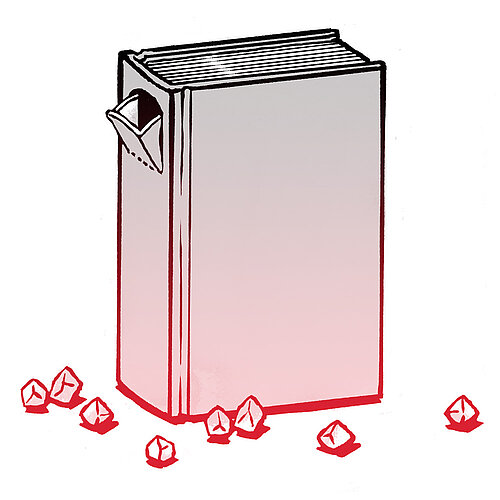We cannot dissect or describe an artwork in the same way that we would the orbit of a planet or the growth of cells. Art is also partly created through our experience of it. Reading a text, we come across black holes and riddles; every metaphor gives rise to questions. We can explore an artwork in its most granular detail – and still come across elements that we fail to explain. To me, it’s these elements that make up the essence of art and literature.
At our “Philological Laboratory” at Freie Universität Berlin, we’re compiling a “Dictionary of Inconspicuous Literary Terms”. Our aim is to give fresh meaning to established terms, such as the tone, the ethos, or the voice of a text, and explore adverbs such as “almost”, “occasionally”, “perhaps”, or “frequently”. Because often it’s these small, fleeting elements that determine the character of a text. It would be wrong, however, to assume that its components can be assembled like building blocks, as if the sum of their parts created their tone or atmosphere.
Literary criticism is an existential experience. When you’re writing and find yourself discovering thoughts you’ve never had before – that’s a privilege. It’s one of our irreducible experiences as humans to have to deal with a world that is meaningful. Our relationships to things and humans always revolve around the dimension of meaning, which the so-called exact sciences are unable to solve by themselves. A researcher is someone in search of something that basically already exists. I would rather refer to myself as a writer, an essayist: someone in search of something they aren’t sure exists. I’m more interested in the act of thinking than in its actual results.
I was raised in Tehran, where I attended a German school. My German teacher was a huge influence on me. I was part of his theater group. He made me realize that we can seriously engage with ideas, the world of thought and imagination, and that it’s worth being open-minded towards things that we don’t initially understand. It’s only through the things that we cannot explain that we really learn to appreciate a text!
To me, every reading, every interpretation has to be a renewal. Perhaps our discipline could do with a small revolution. My teaching style is quite liberal. I don’t set strict guidelines or syllabi because despite the good intentions behind them, they often only end up stifling students’ development. Whenever I get lost in technical details in my own work, I try to recall the experience that set me on that path.
It’s one of my priorities to ensure that research isn’t conducted as an isolated activity, but evolves through exchange with others. In the past, if my academic environment lacked a forum for exchange, I simply went ahead and created one. My own academic standards are best summed up with an insight from the world of psychotherapy: You cannot shape other people’s behavior; you can only change your own. If your thoughts and actions inspire others, that’s a great thing.


